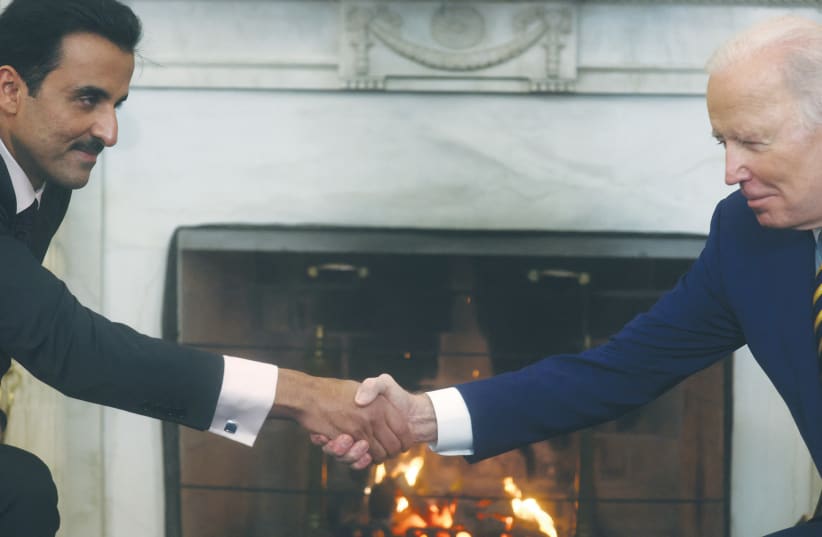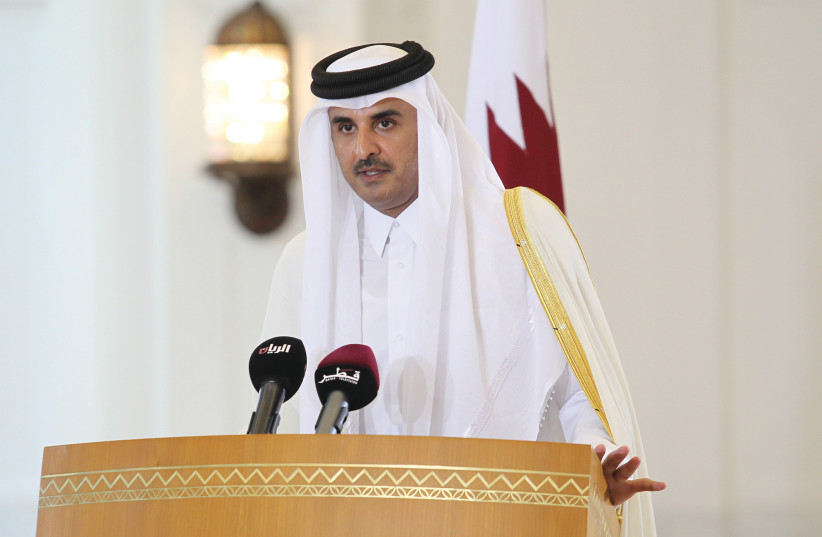I looked at a ball recently and got a glimpse of the future. It was not a crystal ball. It was a football of the type that will be kicked around at the World Cup in Qatar towards the end of this year.
The fact that Qatar is hosting the prestigious international sporting event has raised more than eyebrows – it has raised significant questions about the likely kickbacks involved. The problematic nature of the Qatar World Cup 2022 drew increased attention following the reported deaths of some 6,500 foreign workers building the stadiums and facilities in what has been described as modern slavery in the often merciless heat. Indeed, the desert venue is so inhospitable that FIFA, in an unprecedented move, changed the dates of the tournament from the traditional summertime to the cooler days of November-December.
Allowing Qatar to host the quadrennial World Cup mirrors having the world race to the Beijing Winter Olympics currently taking place despite China’s abominable human rights record, its ongoing control of Tibet, the persecution of the Uyghurs, and threats to Taiwan and the region in general.
It wasn’t either the Olympics or the World Cup, however, that got me thinking about Qatar. It was a handshake that seemed to be overlooked with all that’s going on in the sporting and particularly the non-sporting world.
Although US President Joe Biden was among those who initiated a diplomatic boycott of the Beijing Winter Olympics, it doesn’t look like he’ll voice any protest about the Qatar games. On the contrary. On January 31, Biden welcomed Qatar’s leader, Emir Sheikh Tamim Bin Hamad Al Thani, to an official visit at the White House, going so far as informing the emir of his intention “to designate Qatar as a major non-NATO ally.”
I could hardly believe my ears when I heard it on a late-night news broadcast so I slept on it – a troubled sleep – before checking the wording in the official White House statement. There it was in black and white: “Together, they [Biden and Al Thani] reaffirmed their mutual interest in promoting security and prosperity in the Gulf and broader Middle East region, ensuring the stability of global energy supplies, supporting the people of Afghanistan, and strengthening commercial and investment cooperation. The President and the Amir welcomed the signing of a $20 billion deal between Boeing and Qatar Airways Group, which will support tens of thousands of US manufacturing jobs. In recognition of the strategic partnership between the United States and Qatar, which has deepened over the past 50 years, the President informed the Amir of his intention to designate Qatar as a Major Non-NATO Ally.”
To be fair, even those not following the Winter Olympics have had a lot to distract them lately. It was easy to miss the meeting between Biden and Al Thani, let alone fail to note that the Qatari head of state was the first leader from the Gulf that the US president has hosted since he took up residence in the White House. Support for the Gulf countries involved in the Abraham Accords – peace between Israel, the United Arab Emirates and Bahrain, where Prime Minister Naftali Bennett received a royal welcome this week – obviously took second place. Saudi Arabia, a traditional ally of the US, has yet to experience the warmth of Biden’s VIP treatment by the fireplace in the Oval Office.
Naturally, most eyes have been on the Russia-Ukraine crisis as Vladimir Putin threatened to attack his smaller, democratic neighbor – partly for the sin of wanting to join NATO.
In that global village-way, though separated by thousands of miles, the events aren’t unrelated. One major consequence of the Russia-Ukraine conflict has been Putin’s threat to disrupt gas supplies to Europe if it supports Ukraine. Qatar is a tiny country, with a population of some 3 million people, only 330,000 of them citizens. But what it lacks in human resources, it makes up for with a natural resource. Qatar is the world’s biggest exporter of liquefied natural gas. Hence the reference in the White House statement to “ensuring the stability of global energy supplies.” The crisis in Europe has enabled Qatar to move to the midfield.
There is another comment in the press release which is telling: the reference to Afghanistan. The rushed withdrawal of US and Western forces from Afghanistan last year enabled the Taliban to swiftly take control of the country, taking it back 20 years – backwards to the Dark Ages.
Following the American pullout, Secretary of State Antony Blinken announced that Qatar had been delegated “the US protecting power” in Afghanistan, establishing a US interest section within the Qatari embassy. Qatar, it should be recalled, hosted the Taliban’s office and maintained close ties with it during its years out of power. This relationship enabled Qatar to facilitate the US troop withdrawal, helping to promote the talks and then aiding the evacuation of Americans and other westerners (and some of their Afghan aides).
QATAR, HOWEVER, is playing a double game. On the one hand, it supports terrorism, and on the other, it arbitrates with terrorists. Not only the Taliban have benefited. Qatari money is regularly shipped to Gaza (with the approval of Israel) theoretically to help calm the tensions in the cash-strapped Hamas-controlled enclave. How much of that money really goes on building better living conditions and lives for the local population and how much to strengthening Hamas, an internationally designated terrorist organization, is anyone’s guess. Nitsana Darshan-Leitner, president of Shurat HaDin – Israel Law Center, who tracks and prosecutes sponsors of terrorism, calls Qatar “Palestinian terror’s financial sugar daddy.”
Until not so long ago, Qatar was boycotted by most Arab states. Now it is boosting its standing as an international player. Qatar does not have a stellar history as a top sporting nation or as good sports, although its incredible wealth has enabled it to buy some impressive assets.
When European soccer giant Paris Saint-Germain last year announced that megastar Lionel Messi would be joining the team, it was Qatari funds, not French cash, that made it possible. Qatar Sports Investments, a subsidiary of Qatar’s sovereign wealth fund, has owned PSG since 2011.
Apart from the French soccer scene, Qatar’s investments can be found in places as diverse as the German car industry (Volkswagen), Italian fashion, property in Manhattan and several significant London landmarks. The tiny kingdom also invests in universities around the world, thus building future support, and it holds various banking and financial interests.
For Qatar, the name of the game is buying power and influence. Qatari state-sponsored Al Jazeera is one means of doing that. Hence at the same time that the kingdom presents itself as a moderate force in a troubled region, Qatar adds to the incitement. It uses its money to buy a better image and to boost terrorism.
The world ignores the friendly ties between Doha and Tehran at its peril, the same way it prefers to ignore the meaning behind Iran’s nuclear aspirations and sponsorship of terror organizations including Hamas, Hezbollah and the Houthis. Qatar is using its gas assets to carry out warfare by diplomatic means, to paraphrase the much misquoted Clausewitz. It understands the rules of the game, but is playing a different ballgame altogether.
Watching the US cozying up to Qatar and Washington’s irresponsible urge to return to the 2015 Iran nuclear deal in Vienna does nothing to calm the unease of America’s traditional allies in the Middle East and elsewhere, particularly in view of the pullout from Afghanistan. That’s why the way the Russia-Ukraine crisis plays out will be significant. It’s always a good idea to keep your eye on the ball.
liat@jpost.com

